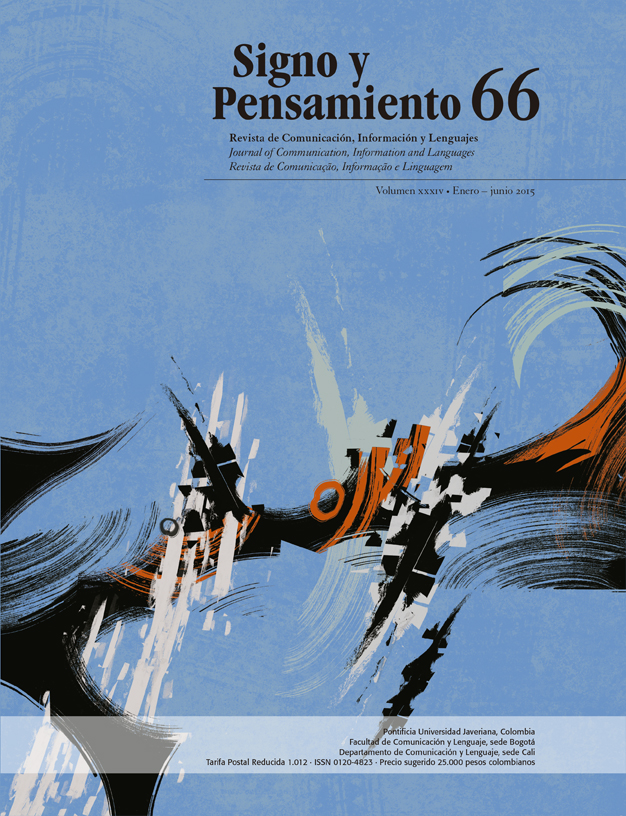Involvement, political participation and types of media consumption in Colombia.
##plugins.themes.bootstrap3.article.details##
In the last ten years the relationship between politics and citizens has been affected by the surge of social media and the Internet, potentially democracy empowerers, as they bring information and more accessible spaces for political participation. This study is intended to analyze two dimensions of the use of the Internet and social networks: entertainment and active political Internet uses (APIU), with the purpose of examining their impact on political involvement and participation on Colombians.
Results suggest that political active uses of the Internet do not have significant effects on political involvement or on political voting participation. Nonetheless, they significantly and positively affect the political protest variable.
Latin America, Colombia, social networks, internet, political involvement, political participationAmérica Latina, Colombia, redes sociales, Internet, involucramiento político, participación políticaAmérica Latina, a Colômbia, redes sociais, Internet, envolvimento político, participação política
Althaus, S. L., y Tewksbury, D. (2000). Patterns of Internet and traditional news media use in a networked community. Political Communication, 17(1), 21-45.
Bimber, B. A. (2003). Information and American democracy: Technology in the evolution of political power. Cambridge: Cambridge University Press.
Boulianne, S. (2009). Does Internet use affect engagement? A meta-analysis of research. Political communication, 26(2), 193-211.
Boulianne, S. (2011). Stimulating or reinforcing political interest: Using panel data to examine reciprocal effects between news media and political interest. Political Communication, 28(2), 147-162.
Brunelle, J. (2013). Political Social Media Users in the Americas are Tolerant and Pro‐Democratic, Number, 92, 1–7.
Bustamante, B. G., y Muñoz, G. H. (2012). Campañas digitales: ¿branding o participación política?: El rol de las redes sociales en la última campaña presidencial chilena. Más poder local, (12), 32-39.
Cantijoch, M., Gallego, A., y Salcedo, J. (2010). Internet y participación política en España. Colección Opiniones y Actitudes, (63).
Dimitrova, D. V., Shehata, A., Strömbäck, J., y Nord, L. W. (2011). The effects of digital media on political knowledge and participation in election campaigns: Evidence from panel data. Communication Research.
Feddersen, T., y Pesendorfen, W. (1999). Abstention in Election with Asymmetric Information and Diverse Preferences. American Political Science Review, 93(2), 381-398.
Feddersen, T., y Pesendorfen, W. (1997). Voting Behavior and Information Aggregation in Election with Private Information. Econometrica, 65(5), 1029-1058.
García, M., y Wills, L. (2011). El poder de la televisión. Medios de comunicación y aprobación presidencial en Colombia. En Medios, democracia y poder: Una mirada comparada desde Colombia, Ecuador, Venezuela y Argentina. Bogotá: Universidad de los Andes.
González Bustamante, B., y Henríquez Muñoz, G. (2012). Campañas digitales: ¿Branding o participación política? El rol de las redes sociales en la última campaña presidencial chilena. Comunicación Política 2.0 y Liderazgo, Madrid: Asociación Latinoamericana de Investigadores en Campañas Electorales (ALICE).
Hardy, B. W., y Scheufele, D. A. (2005). Examining Differential Gains From Internet Use: Comparing the Moderating Role of Talk and Online Interactions. Journal of Communication, 55(1), 71–84.
Hirzalla, F., van Zoonen, L., y de Ridder, J. (2010). Internet Use and Political Participation: Reflections on the Mobilization/Normalization Controversy. The Information Society, 27(1), 1–15.
Kruikemeier, S., Noort, G. van, Vliegenthart, R., y Vreese, C. H. de. (2013). Getting closer: The effects of personalized and interactive online political communication. European Journal of Communication.
Kushin, M., y Kitchener, K. (2009). Getting political on social networks sites: Exploring online political discourse on Facebook. First Monday 14 (11).
Kwak, N., Poor, N., y Skoric, M. M. (2006). Honey, I Shrunk the World! The Relation Between Internet Use and International Engagement. Mass Communication and Society, 9(2), 189–213.
Lee, R., y Smith, A. (2008, junio 15). Pew Research Center: Internet, Science and Tech. Disponible en http://www.pewinternet.org/2008/06/15/the-internet-and-the2008-election/
Lee, R., y Smith, A. (2012, septiembre 4). Pew Research Cente: Internet, Science and Tech. Disponibe en http://www.pewinternet. org/2012/09/04/politics-on-social-networking-sites/
Lee, R., y Smith, A. (2012, marzo 12). Pew Research Center: Internet, Science and Teach. Disponible en http://www.pewinternet.org/ fact-sheets/social-networking-fact-sheet/
Lupia, A., y Philpot, T. S. (2005). Views from Inside the Net: How Websites Affect Young Adults’ Political Interest. Journal of Politics, 67(4), 1122–1142.
Mossberger, K., Tolbert, C. J., y Stansbury, M. (2003). Virtual Inequality: Beyond the Digital Divide. Georgetown University Press.
Norris, P. (2001). Digital Divide: Civic Engagement, Information Poverty, and the Internet Worldwide. Cambridge: Cambridge University Press.
Putnam, R. (2000). The Bowling Alone. New York: Simon y Schuster.
Schmierbach, M., Shah, D., Hawkins, J., Espino, R., y Donavan, J. (2013). Nonrecursive models of Internet use and communty engagement. Questioning whether time spent online erodes social capital. Journalism & Mass Communication Quarterly, 79(4), 964-987.
Shah, D. V., Cho, J., Eveland, W. P., y Kwak, N. (2005). Information and Expression in a Digital Age Modeling Internet Effects on Civic Participation. Communication Research, 32(5), 531–565.
Shah, D. V., McLeod, J. M., y Yoon, S. H. (2001). Communication, Context, and Community An Exploration of Print, Broadcast, and Internet Influences. Communication Research, 28(4), 464–506.
Strömbäck, J., y Shehata, A. (2010). Media malaise or a virtuous circle? Exploring the causal relationships between news media exposure, political news attention and political interest. European Journal of Political Research, 49(5), 575–597.
Sustein, C. (2001). Republic.com. New York: Princeton University Press. Tedesco, J. C. (2007). Examining Internet Interactivity Effects on Young Adult Political Information Efficacy. American Behavioral Scientist, 50(9), 1183–1194.
Wang, S.-I. (2007). Political Use of the Internet, Political Attitudes and Political Participation. Asian Journal of Communication, 17(4), 381–395.
Wilhelm, A. G. (2000). Democracy in the Digital Age challenges to political life in cyberspace. New York: Routledge.
Zúñiga, H. G. D., Puig-I-Abril, E., y Rojas, H. (2009). Weblogs, traditional sources online and political participation: an assessment of how the Internet is changing the political environment. New Media y Society, 11(4), 553–574.


